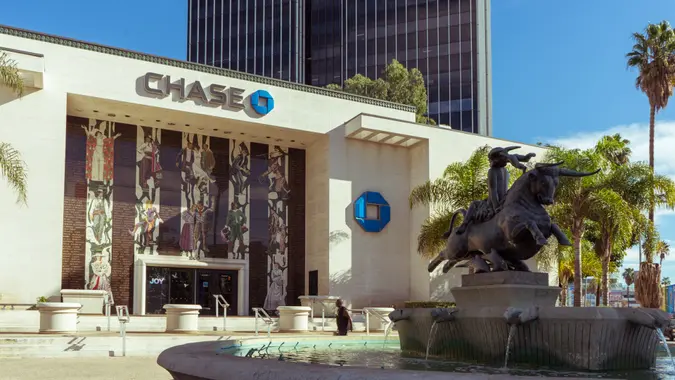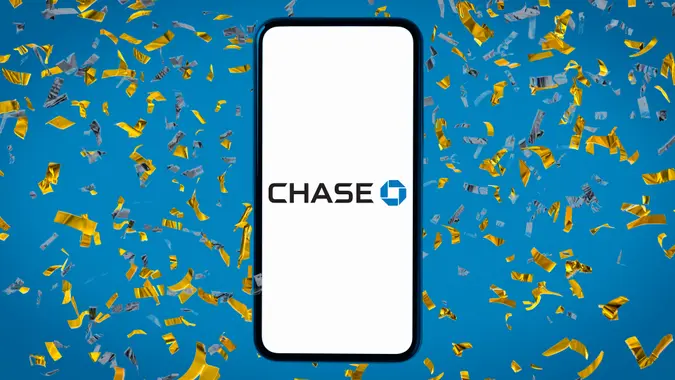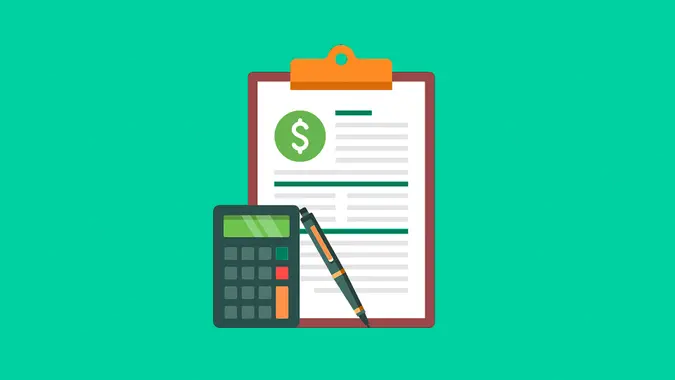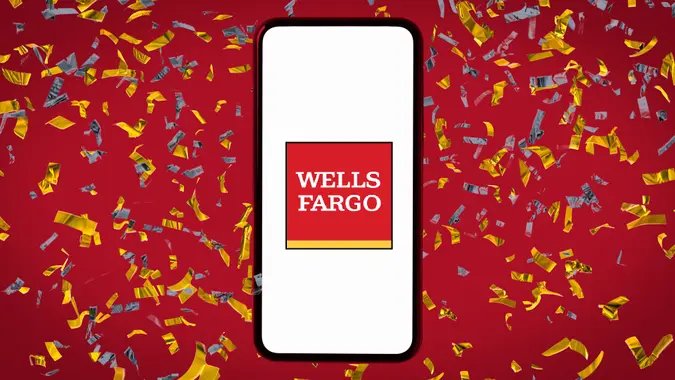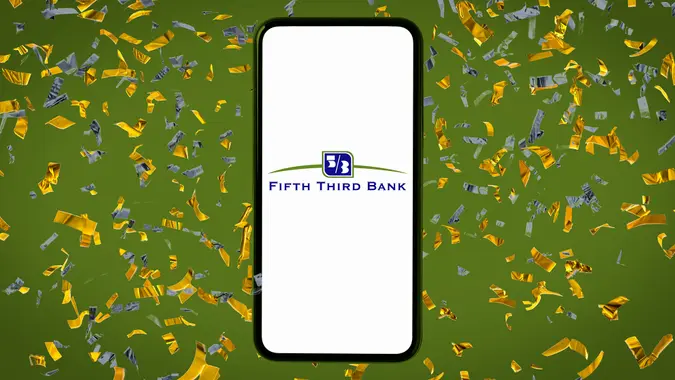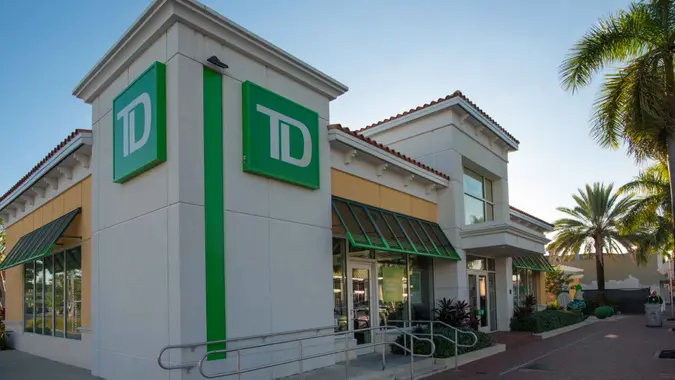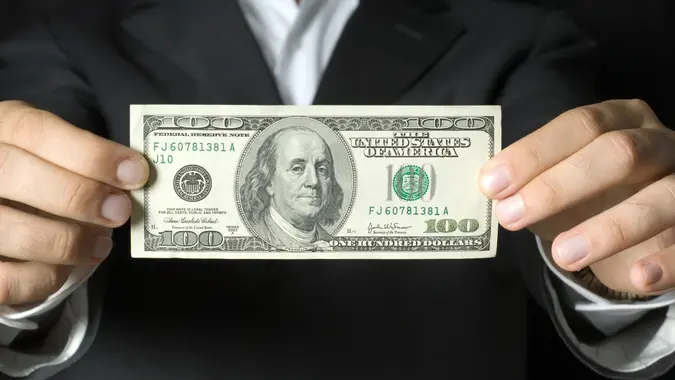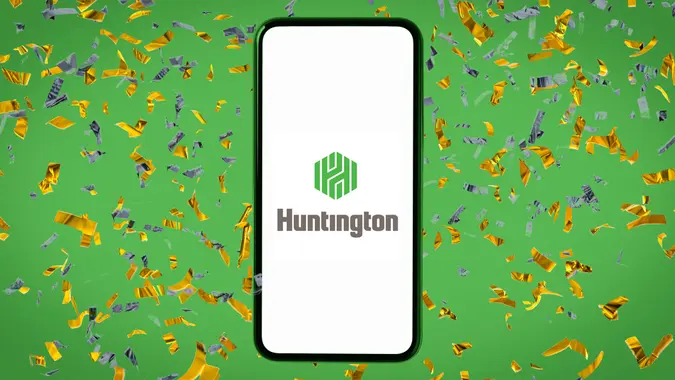The Future of Banking: When Will We No Longer Need Cash?

Commitment to Our Readers
GOBankingRates' editorial team is committed to bringing you unbiased reviews and information. We use data-driven methodologies to evaluate financial products and services - our reviews and ratings are not influenced by advertisers. You can read more about our editorial guidelines and our products and services review methodology.

20 Years
Helping You Live Richer

Reviewed
by Experts

Trusted by
Millions of Readers
In 1950, Americans could pay for dinner at a restaurant even if they left their money at home for the first time in history. That was the year Diners Club introduced the world’s first credit card.
More than 70 years later, the cashless society that’s been promised since then still hasn’t materialized. Despite direct deposit, BNPL, Apple Pay, Venmo, cryptocurrency and the rest, green paper rectangles with pictures of dead presidents still have a home in our wallets.
If mobile banking apps and blockchains didn’t bring death to the dollar, is the long-awaited cashless society a myth, or is the generation coming of age today the last that will ever see paper money outside of a museum?
The Writing Is on the Wall for the Good Old Greenback
According to The New York Times, central banks across the world are experimenting with digital versions of their money — kind of like Bitcoin, but issued by the state and controlled as a currency. Sweden, China, Japan and others are introducing these digital currencies alongside old-fashioned cash. The plan in large would be to phase out paper money gradually over time.
According to the Atlantic Council, the U.S. Federal Reserve recently began working on a bank-to-bank digital currency of its own designed to speed up transfers between the world’s financial institutions. Unlike the previously mentioned countries, America’s central bank digital currency (CBDC) is only for wholesale transactions and isn’t yet a consumer currency — “yet” being the key word.
According to the Board of Governors of the Federal Reserve System, “While Americans have long held money predominantly in digital form — for example in bank accounts, payment apps or through online transactions — a CBDC would differ from existing digital money available to the general public because a CBDC would be a liability of the Federal Reserve, not of a commercial bank.”
In short, America’s money is going digital, and eventually, that will have to spell the end for cash — right?
For a Country Transitioning Into a Cash-Free Society, America Sure Is Flush With Cash
Conventional wisdom says that it’s not a matter of if but when cash goes extinct and all commerce becomes digital commerce.
Not everyone is convinced.
“I do not believe this to be true,” said Allan M. Siegel, partner at Chaikin, Sherman, Cammarata & Siegel, P.C. “If we go back to a cashless society, we essentially take a step backward in evolution. There will always be forms of cash among the population that have nothing to do with the digital era. If the majority of society does move toward a cashless society I believe it will only make material cash more valuable.”
Whether that’s true or not, one thing is certain, there’s more cash in the economy today than ever before. According to the Bank For International Settlements, there was just $428 worth of coins and banknotes per person circulating in the United States in 1978. Forty years later in 2018, it was $5,238 per person.
Some States and Cities Protect Cash by Law
In 1978, Massachusetts became the first state to enact a law enshrining the use of cash as a medium of exchange. It states: “No retail establishment offering goods and services for sale shall discriminate against a cash buyer by requiring the use of credit.”
During the shift to e-commerce during the pandemic, the state attorney general had to remind business owners that the law was still on the books.
It was the only law of its kind for four decades. Then in 2019, New Jersey enacted a law protecting cash buyers, followed closely by Philadelphia, San Francisco, Rhode Island, New York City and Washington, D.C., all within one year.
Cash Is Still Important Even If It’s No Longer King
In most cases, legislators said they wrote the pro-cash laws to protect low-income people who might not have bank accounts or access to technology and digital payment systems. But according to Cash Matters, that’s not the only reason to stick with money as we know it. The organization argues that America shouldn’t and can’t ever fully detach from paper money because cash:
- Ensures stable currency
- Is the most secure payment method
- Is low tech
- Is fast and effective
- Is the most democratic medium of exchange
- Is resilient in difficult economic times
- Is universal
- Transcends socio-economic boundaries
- Is free to use
- Fosters national identity
Cash Will Outlive Its Usefulness as a Currency
Generations of Americans couldn’t have imagined that pieces of paper would ever replace precious metals like silver and gold as the primary medium of exchange. They certainly wouldn’t have understood how cash could be worth anything if it weren’t at least backed by physical gold.
Even so, President Franklin D. Roosevelt’s 1933 gold program officially ended the era of skeptical merchants biting hunks of purported gold to validate their authenticity at the time of purchase.
In 1971, President Richard Nixon took the United States off the gold standard entirely, and today, no American younger than 52 has ever handled money that was backed by anything but reassurance from the government.
Yet gold endures — not as a currency or medium of exchange, but as a store of value, an investment and a physical collectible. Some experts see a similar future for the almighty dollar.
“Advanced economies require value carriers like money, bonds and stocks,” said Robert Davidson, CEO of California Title Loans. “Within the next 20 years, the world will go fully cashless. Money will be in digital format, just like credit cards, bank accounts and PayPal. But if you mean will the world remove currency altogether, then no.”
More From GOBankingRates
- 5 Japanese Cars To Stay Away From Buying
- Ramit Sethi: How To Become Rich on a Low Salary
- 5 Clever Ways to Speed Up Your Retirement Savings
- 3 Things You Must Do When Your Savings Reach $50,000
 Written by
Written by  Edited by
Edited by 



